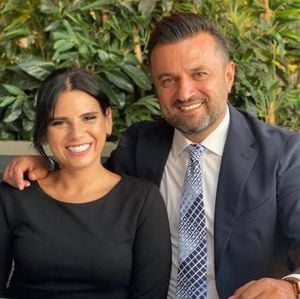Eni Aluko has issued a public apology to Ian Wright after her comments regarding his role in women’s football sparked significant backlash. The former England striker and current pundit suggested that Wright, a prominent figure in the sport, might be inadvertently blocking opportunities for female pundits. Aluko made her remarks during an interview on BBC Radio 4's Woman's Hour, where she expressed concerns about the limited opportunities available for women in broadcasting.
On April 25, 2025, Aluko, who made history as the first woman to appear on BBC Match of the Day as a pundit in 2014, stated that Wright is 'dominating' the women’s game and needs to be more aware of the impact of his presence. "I've worked with Ian a long time and, you know, I think he's a brilliant broadcaster, but I think he's aware of just how much he's doing in the women’s game. I think he should be aware of that," she said.
Aluko's comments struck a nerve, especially given Wright's longstanding advocacy for women's football. Wright has been a vocal supporter of the women’s game, frequently appearing as a pundit for ITV and covering high-profile matches involving the Lionesses. He has also contributed to the sport by funding rehabilitation for injured players and supporting training for female coaches.
Despite her intentions to highlight the broader issue of gender inequality in sports broadcasting, Aluko faced criticism for singling out Wright. Many noted that he has been a significant ally for women's football, often using his platform to uplift female players and pundits. In response to the backlash, Aluko took to Instagram to clarify her comments. "Ian Wright is a brilliant broadcaster and role model whose support for the women’s game has been significant," she wrote. "In my interview with Woman's Hour this week, I was trying to make a broader point about the limited opportunities for women in football – whether that’s in coaching, broadcasting or commercial spaces – and the importance of creating more space for women to thrive on and off the pitch. But it was wrong for Ian’s name to be raised in that conversation, and for that I sincerely apologise. I’ve known and worked with Ian for many years and have nothing but love and respect for him."
Aluko's remarks came during a critical time for women’s football, which is still striving for equal representation and opportunities in various sectors, including coaching and broadcasting. She emphasized that, while the women’s game is growing, there are still only a "finite amount of opportunities" available, making it crucial for those in prominent positions to be aware of their influence.
When pressed about whether it was wrong for Wright to cover women’s football, Aluko responded, "I don't know about wrong, but I think we need to be conscious and we need to make sure that women are not being blocked from having a pathway into broadcasting in the women's game. It's still new, it's still growing. There's a finite amount of opportunities and I think that men need to be aware of that."
This incident highlights the ongoing challenges faced by women in sports, particularly in gaining visibility and opportunities in broadcasting roles traditionally dominated by men. Aluko's comments and subsequent apology have sparked a broader conversation about the need for equitable representation in sports media.
Wright, who has been involved in various initiatives to promote women’s football, including funding for grassroots coaching programs, has long been recognized as a key player in the movement toward gender equality in the sport. He has made significant personal contributions, such as paying £1,700 a month to support the rehabilitation of Kayleigh McDonald, a player who suffered an ACL injury while playing for Stoke City.
Moreover, Wright has engaged with audiences through various platforms, including his YouTube series 'Wrighty's Diary' during the 2023 Women’s World Cup and his podcast 'Crossways', which he co-hosts with Manchester City and England legend Steph Houghton.
As the conversation about gender equality in sports continues, both Aluko and Wright remain influential figures in advocating for women's football. Their collaboration and mutual respect highlight the importance of solidarity in the fight for equal opportunities. Aluko’s apology serves as a reminder of the delicate balance needed in discussions surrounding representation and the responsibilities that come with being a public figure in sports.
Moving forward, it will be essential for the sports community to foster environments where all voices are heard, and where women can thrive alongside their male counterparts. The dialogue initiated by Aluko's comments could pave the way for more significant changes in broadcasting and coaching opportunities for women in football.






